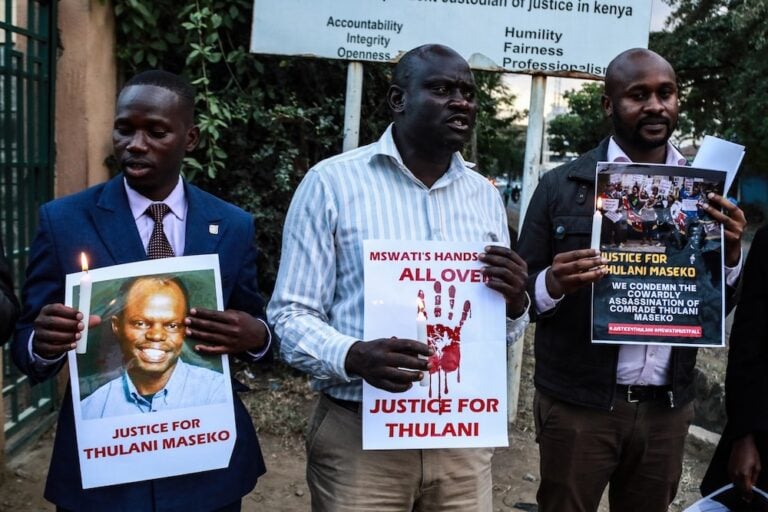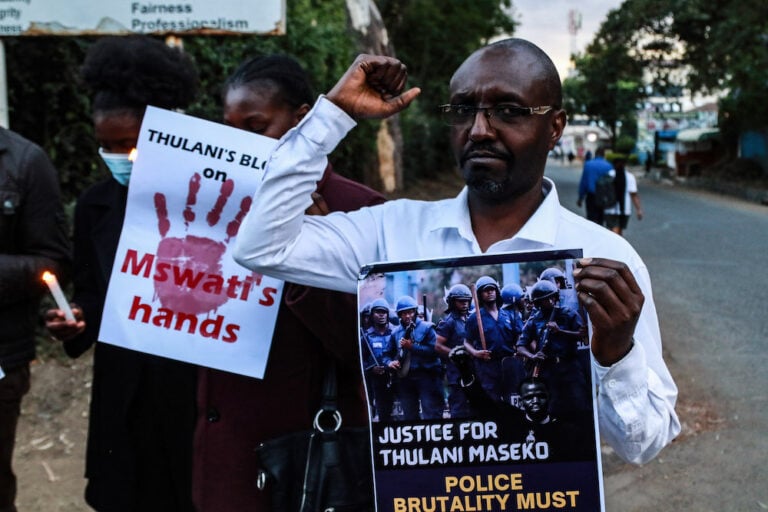Swaziland’s only independent newspaper group said the ruling monarchy was planning ways of forcing it to close down. In a “The Times of Swaziland” editorial of 7 August 1996, the newspaper said that there were “strong indications that pressure is being put on the authorities to close down The Times of Swaziland group of newspapers….” […]
Swaziland’s only independent newspaper group said the ruling
monarchy was planning ways of forcing it to close down. In a “The
Times of Swaziland” editorial of 7 August 1996, the newspaper said
that there were “strong indications that pressure is being put on
the authorities to close down The Times of Swaziland group of
newspapers….” Swaziland authorities have, however, denied this.
In the 7 August editorial, “The Times of Swaziland” further said
that, if closed, “then the only unfettered organ of democracy in
Swaziland will be silenced,” and will leave manipulative
authorities with a free hand, “no longer having to fear that their
misdeeds and misbehaviour will be made public.”
Douglas Loffler, publisher of The Times of Swaziland Newspaper
Group, confirmed reports that his newspapers were under pressure
of closure from the Swaziland royal family. Speaking to MISA on 15
August, Loffler said he had been told by persons within royal and
political echelons that “some people within the royal family had
taken offence of the writing on the King and that the newspapers
were in danger of being forced to close down.”
Swaziland authorities were reportedly angered by a series of
articles which had alleged authorities of abusing the country’s
limited economic resources and exhibiting a lack of respect for
the rule of law. Bheki Makhubu, editor and columnist of “The Times
Sunday” newspaper (another title of the Times of Swaziland group),
published in a 21 July edition an opinion article opening with the
header “So, King Mswati is a businessman.” The article was
referring to the E8 million (about US$ 1.9 million) hotel King
Mswati had purchased amid labour unrest in the country earlier
this year. The article further alluded to the King’s six wives’
occupation each of a palace as an unnecessary luxury in the face
of the country’s abject poverty. The article further likened
Mswati to Zaire’s President Mobuto Sese Seko and former Malawi
President Hastings Banda who, he wrote, had amassed wealth at the
expense of the poor. The newspapers also reported government
authorities as using their royal and political clout to grab land
unlawfully and to evade loan repayment to the local bank set up to
assist the citizenry.
These articles reportedly angered and prompted authorities to look
at ways of forcing the newspaper group to close down. On 11
August, Makhubu issued an apology to the King over the articles
authorities reportedly saw as “‘abusive to and disrespectful of
the King.'” In the apology, Makhubu wrote, “It has not been my
intention to offend Your Majesty, but in my thirst for change, I
understand now that I have overstepped the mark….” But Makhubu
told MISA, “I had to apologize to save our jobs.”
The Acting Permanent Secretary in the Ministry of Information and
Broadcasting, Eric Dlamini, however, refuted allegations that
authorities were planning to close down The Times of Swaziland
group. “Cabinet says it is not true. It said it was not aware of
the alleged plans,” Dlamini told MISA on 16 September. He added
that the group’s newspapers were operating normally in Swaziland.
Background Information
“The Times of Swaziland” newspaper was first established in 1897
and to date remains the only independently-owned newspaper in
Swaziland. In 1983, it became The Times of Swaziland Group of
Newspapers when “The Times Saturday” was established. In 1980,
“The Times Sunday” was born, bringing the total to three
newspapers. The state-controlled newspaper, “The Swazi Observer”,
is the only other newspaper in the country. Since The Times of
Swaziland newspapers were established, they have been considered a
thorn in the side of authorities. In a country where freedom of
expression has not been guaranteed, the newspapers have constantly
published articles beyond the imaginary official boundaries.


